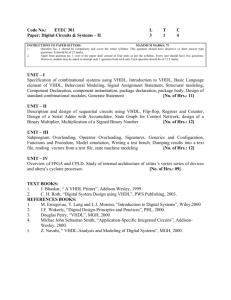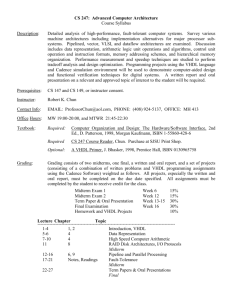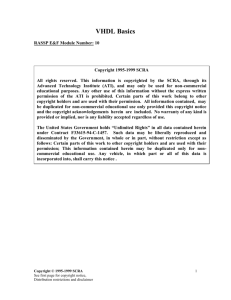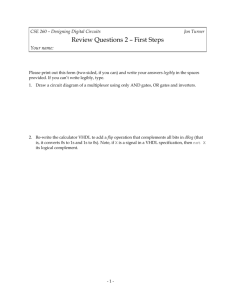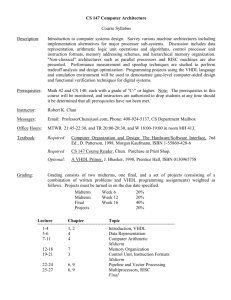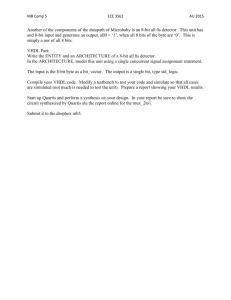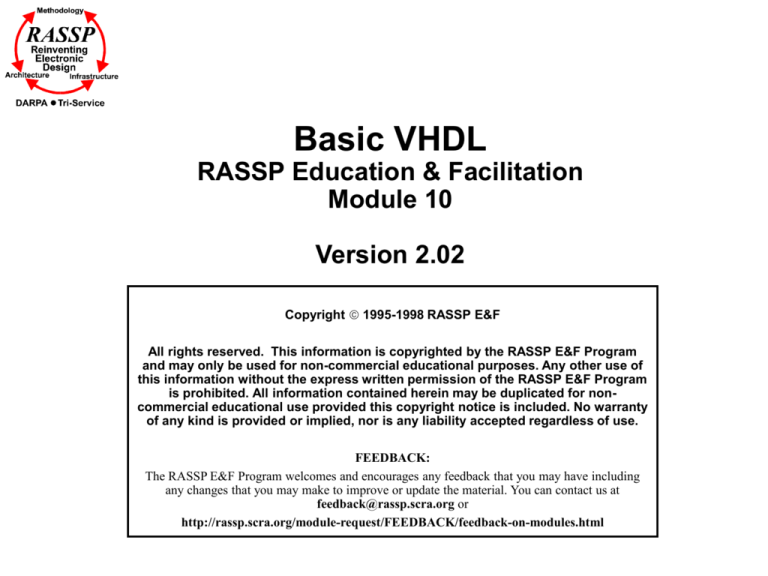
Basic VHDL
RASSP Education & Facilitation
Module 10
Version 2.02
Copyright 1995-1998 RASSP E&F
All rights reserved. This information is copyrighted by the RASSP E&F Program
and may only be used for non-commercial educational purposes. Any other use of
this information without the express written permission of the RASSP E&F Program
is prohibited. All information contained herein may be duplicated for noncommercial educational use provided this copyright notice is included. No warranty
of any kind is provided or implied, nor is any liability accepted regardless of use.
FEEDBACK:
The RASSP E&F Program welcomes and encourages any feedback that you may have including
any changes that you may make to improve or update the material. You can contact us at
feedback@rassp.scra.org or
http://rassp.scra.org/module-request/FEEDBACK/feedback-on-modules.html
RASSP Roadmap
RASSP E&F
SCRA GT UVA Raytheon
UCinc EIT ADL
RASSP DESIGN LIBRARIES AND DATABASE
Primarily
software
HW
DESIGN
SYSTEM
DEF.
FUNCTION
DESIGN
HW &
SW
PART.
HW & SW
CODESIGN
VHDL
Copyright 1995-1998 RASSP E&F
Primarily
hardware
VIRTUAL PROTOTYPE
HW
FAB
INTEG.
& TEST
SW
DESIGN
SW
CODE
Module Goals
RASSP E&F
SCRA GT UVA Raytheon
UCinc EIT ADL
Introduce basic VHDL constructs
Introduce the VHDL simulation cycle and timing
model
Illustrate VHDL’s utility as a digital hardware
description language
Copyright 1995-1998 RASSP E&F
Module Outline
RASSP E&F
SCRA GT UVA Raytheon
UCinc EIT ADL
Introduction
VHDL Design Example
VHDL Model Components
Entity
Declarations
Architecture
Timing
Copyright 1995-1998 RASSP E&F
Descriptions
Model
Module Outline (Cont.)
RASSP E&F
SCRA GT UVA Raytheon
UCinc EIT ADL
Basic VHDL Constructs
Data
types
Objects
Sequential and concurrent statements
Packages and libraries
Attributes
Predefined operators
Examples
Summary
Copyright 1995-1998 RASSP E&F
Module Outline
RASSP E&F
SCRA GT UVA Raytheon
UCinc EIT ADL
Introduction
VHDL Design Example
VHDL Model Components
Basic VHDL Constructs
Examples
Summary
Copyright 1995-1998 RASSP E&F
VHDL Education Coverage
RASSP E&F
SCRA GT UVA Raytheon
UCinc EIT ADL
In a survey of 71 US universities (representing
about half of the EE graduating seniors in 1993),
they reported
44%
have no training on or use of VHDL in any
undergraduate EE course
45% have no faculty members who can teach VHDL
14% of the graduating seniors have a working
knowledge of VHDL and only 8% know Verilog
However, in the 1994 USE/DA Standards Survey,
85% of the engineers surveyed were designers
and reported
55%
were familiar with EDIF
55% were familiar with VHDL
33% were familiar with Verilog
Copyright 1995-1998 RASSP E&F
Reasons for Using VHDL
RASSP E&F
SCRA GT UVA Raytheon
UCinc EIT ADL
VHDL is an international IEEE standard
specification language (IEEE 1076-1993) for
describing digital hardware used by industry
worldwide
VHDL
is an acronym for VHSIC (Very High Speed
Integrated Circuit) Hardware Description Language
VHDL enables hardware modeling from the gate
to system level
VHDL provides a mechanism for digital design
and reusable design documentation
Copyright 1995-1998 RASSP E&F
VHDL’s History
RASSP E&F
SCRA GT UVA Raytheon
UCinc EIT ADL
Very High Speed Integrated Circuit (VHSIC)
Program
Launched
in 1980
Aggressive effort to advance state of the art
Object was to achieve significant gains in VLSI
technology
Need for common descriptive language
$17 Million for direct VHDL development
$16 Million for VHDL design tools
Woods Hole Workshop
Held
in June 1981 in Massachusetts
Discussion of VHSIC goals
Comprised of members of industry, government, and
academia
Copyright 1995-1998 RASSP E&F
VHDL’s History (Cont.)
RASSP E&F
SCRA GT UVA Raytheon
UCinc EIT ADL
In July 1983, a team of Intermetrics, IBM and
Texas Instruments were awarded a contract to
develop VHDL
In August 1985, the final version of the language
under government contract was released: VHDL
Version 7.2
In December 1987, VHDL became IEEE Standard
1076-1987 and in 1988 an ANSI standard
In September 1993, VHDL was restandardized to
clarify and enhance the language
VHDL has been accepted as a Draft International
Standard by the IEC
Copyright 1995-1998 RASSP E&F
Gajski and Kuhn’s Y Chart
RASSP E&F
SCRA GT UVA Raytheon
UCinc EIT ADL
Architectural
Behavioral
Structural
Algorithmic
Systems
Functional Block
Processor
Hardware Modules
Algorithms
Logic
ALUs, Registers
Register Transfer
Circuit Gates, FFs
Logic
Transistors
Transfer Functions
Rectangles
Cell, Module Plans
Floor Plans
Clusters
Physical Partitions
Physical/Geometry
Copyright 1995-1998 RASSP E&F
Representation of a
RASSP System
RASSP E&F
SCRA GT UVA Raytheon
UCinc EIT ADL
Independently Describe: 1) Resolution of INTERNAL (kernel) details
2) Representation of EXTERNAL (Interface) details
In terms of:
Temporal Resolution
High Res.
Gate
Propagation (pS)
Clock Cycle
(10s of nS)
Instr. Cycle
(10s of uS)
System Event
(10s of mS)
Low Res.
Token
(Blue)
Low Res.
Data Value Resolution
High Res.
Bit true
(0b01101)
Functional Resolution
Value True
(13)
Composite
(13,req,(2.33, j89.2))
High Res.
All functions modeled
(Full-functional)
Structural Resolution
Some functions not modeled
(Interface-functional)
Low Res.
High Res.
Structural
Block diagram
Single block box
Low Res.
Gate netlist
Major blocks
(No implementation info)
Programming Level (Full implementation) (Some implementation info)
High Res.
Microcode
Assembly
HLL (Ada,C)
code
Statements
(fmul r1,r2)
(i := i+1)
(Note: Low resolution of details = High level of abstraction
High resolution of details = Low level of abstraction
Copyright 1995-1998 RASSP E&F
DSP primitive
Block-oriented
(FFT(a,b,c))
Major
Low Res.
modes
(Search,Track)
[Hein97]
Graphical Representation of
the Model Levels using the
RASSP Taxonomy
RASSP E&F
SCRA GT UVA Raytheon
UCinc EIT ADL
Symbol Key
Model resolves information at specific level
Model resolves information at any of the levels spanned,
case dependent
Model optionally resolves information at levels spanned
Model resolves partial information at levels spanned, such
as control but not data values or functionality
Model does not contain information on attribute
Virtual Prototype
A Virtual Prototype can be constructed at
any level of abstraction and may include a
mixture of levels. It can be configured
quickly and cost-effectively, and, being a
computer simulation, provides noninvasive observability of internal states.
Copyright 1995-1998 RASSP E&F
Internal
External
Temporal
Data Value
Functional
Structural
SW Programming Level
[Hein97]
Graphical Representation of
the Model Levels using the
RASSP Taxonomy (Cont.)
RASSP E&F
SCRA GT UVA Raytheon
UCinc EIT ADL
Behavioral Level
A behavioral model describes the function
and timing of a component without
describing a specific implementation
Internal
External
Temporal
Data Value
Functional
Structural
SW Programming Level
RTL Level
An RTL model describes a system in terms
of registers, combinational circuitry, lowlevel buses, and control circuits, usually
implemented as finite state machines
Internal
External
Temporal
Data Value
Functional
Structural
SW Programming Level
Copyright 1995-1998 RASSP E&F
[Hein97]
Graphical Representation of
the Model Levels using the
RASSP Taxonomy (Cont.)
RASSP E&F
SCRA GT UVA Raytheon
UCinc EIT ADL
Algorithm Level
The algorithm level of abstraction
describes a procedure for implementing a
function as a specific sequence of
arithmetic operations, conditions, and
loops
Internal
External
Temporal
Data Value
Functional
Structural
SW Programming Level
Performance Level
Performance models may be written at any
level of abstraction and measure system
performance associated with response
time, throughput, and utilization
Internal
External
Temporal
Data Value
Functional
Structural
SW Programming Level
Copyright 1995-1998 RASSP E&F
[Hein97]
Graphical Representation of
the Model Levels using the
RASSP Taxonomy (Cont.)
RASSP E&F
SCRA GT UVA Raytheon
UCinc EIT ADL
Structural Level
A structural model represents a
component or system in terms of the
interconnections of its constituent
components.
Internal
External
Temporal
Data Value
Functional
Structural
SW Programming Level
Gate Level
A gate-level model describes the function,
timing, and structure of a component in
terms of the structural interconnection of
boolean logic blocks
Internal
External
Temporal
Data Value
Functional
Structural
SW Programming Level
Copyright 1995-1998 RASSP E&F
[Hein97]
Additional Benefits of VHDL
RASSP E&F
SCRA GT UVA Raytheon
UCinc EIT ADL
Allows for various design methodologies
Provides technology independence
Describes a wide variety of digital hardware
Eases communication through standard
language
Allows for better design management
Provides a flexible design language
Has given rise to derivative standards :
WAVES,
Copyright 1995-1998 RASSP E&F
VITAL, Analog VHDL
Putting It All Together
RASSP E&F
SCRA GT UVA Raytheon
UCinc EIT ADL
Package
Generics
Architectur
e
Concurren
t
Statement
Copyright 1995-1998 RASSP E&F
Entity
Architectur
e
Concurren
t
Statement
s
Ports
Architectur
e
Process
Sequential Statements
Module Outline
RASSP E&F
SCRA GT UVA Raytheon
UCinc EIT ADL
Introduction
VHDL Design Example
VHDL Models of Hardware
Basic VHDL Constructs
Examples
Summary
Copyright 1995-1998 RASSP E&F
VHDL Design Example
RASSP E&F
SCRA GT UVA Raytheon
UCinc EIT ADL
Problem: Design a single bit half adder with carry
and enable
Specifications
Inputs and outputs are each one bit
When enable is high, result gets x plus y
When enable is high, carry gets any carry of x plus y
Outputs are zero when enable input is low
x
y
enable
Copyright 1995-1998 RASSP E&F
Half Adder
carry
result
VHDL Design Example
Entity Declaration
RASSP E&F
SCRA GT UVA Raytheon
UCinc EIT ADL
As a first step, the entity declaration describes
the interface of the component
input
and output ports are declared
ENTITY half_adder IS
PORT( x, y, enable: IN BIT;
carry, result: OUT BIT);
END half_adder;
x
y
enable
Copyright 1995-1998 RASSP E&F
Half
Adder
carry
result
VHDL Design Example
Behavioral Specification
RASSP E&F
SCRA GT UVA Raytheon
UCinc EIT ADL
A high level description can be used to describe
the function of the adder
ARCHITECTURE half_adder_a OF half_adder IS
BEGIN
PROCESS (x, y, enable)
BEGIN
IF enable = ‘1’ THEN
result <= x XOR y;
carry <= x AND y;
ELSE
carry <= ‘0’;
result <= ‘0’;
END IF;
END PROCESS;
END half_adder_a;
The model can then be simulated to verify correct
functionality of the component
Copyright 1995-1998 RASSP E&F
VHDL Design Example
Data Flow Specification
RASSP E&F
SCRA GT UVA Raytheon
UCinc EIT ADL
A second method is to use logic equations to
develop a data flow description
ARCHITECTURE half_adder_b OF half_adder IS
BEGIN
carry <= enable AND (x AND y);
result <= enable AND (x XOR y);
END half_adder_b;
Again, the model can be simulated at this level to
confirm the logic equations
Copyright 1995-1998 RASSP E&F
VHDL Design Example
Structural Specification
RASSP E&F
SCRA GT UVA Raytheon
UCinc EIT ADL
As a third method, a structural description can be
created from predescribed components
x
y
enable
carry
result
These gates can be pulled from a library of parts
Copyright 1995-1998 RASSP E&F
VHDL Design Example
Structural Specification (Cont.)
ARCHITECTURE half_adder_c OF half_adder IS
COMPONENT and2
PORT (in0, in1 : IN BIT;
out0 : OUT BIT);
END COMPONENT;
COMPONENT and3
PORT (in0, in1, in2 : IN BIT;
out0 : OUT BIT);
END COMPONENT;
COMPONENT xor2
PORT (in0, in1 : IN BIT;
out0 : OUT BIT);
END COMPONENT;
FOR ALL : and2 USE ENTITY gate_lib.and2_Nty(and2_a);
FOR ALL : and3 USE ENTITY gate_lib.and3_Nty(and3_a);
FOR ALL : xor2 USE ENTITY gate_lib.xor2_Nty(xor2_a);
-- description is continued on next slide
Copyright 1995-1998 RASSP E&F
RASSP E&F
SCRA GT UVA Raytheon
UCinc EIT ADL
VHDL Design Example
Structural Specification (cont.)
-- continuing half_adder_c description
SIGNAL xor_res : BIT; -- internal signal
-- Note that other signals are already declared in entity
BEGIN
A0 : and2 PORT MAP (enable, xor_res, result);
A1 : and3 PORT MAP (x, y, enable, carry);
X0 : xor2 PORT MAP (x, y, xor_res);
END half_adder_c;
Copyright 1995-1998 RASSP E&F
RASSP E&F
SCRA GT UVA Raytheon
UCinc EIT ADL
Module Outline
RASSP E&F
SCRA GT UVA Raytheon
UCinc EIT ADL
Introduction
VHDL Design Example
VHDL Model Components
Entity Declarations
Architecture Descriptions
Timing Model
Basic VHDL Constructs
Examples
Summary
Copyright 1995-1998 RASSP E&F
VHDL Model Components
RASSP E&F
SCRA GT UVA Raytheon
UCinc EIT ADL
A complete VHDL component description
requires a VHDL entity and a VHDL architecture
The
entity defines a component’s interface
The architecture defines a component’s function
Several alternative architectures may be
developed for use with the same entity
Three areas of description for a VHDL
component:
Structural
descriptions
Behavioral descriptions
Timing and delay descriptions
Copyright 1995-1998 RASSP E&F
VHDL Model Components (cont.)
RASSP E&F
SCRA GT UVA Raytheon
UCinc EIT ADL
Fundamental unit for component behavior
description is the process
Processes
may be explicitly or implicitly defined and
are packaged in architectures
Primary communication mechanism is the signal
Process
executions result in new values being assigned
to signals which are then accessible to other processes
Similarly, a signal may be accessed by a process in
another architecture by connecting the signal to ports
in the the entities associated with the two architectures
Example signal assignment statement :
Output <= My_id + 10;
Copyright 1995-1998 RASSP E&F
Entity Declarations
RASSP E&F
SCRA GT UVA Raytheon
UCinc EIT ADL
The primary purpose of the entity is to declare
the signals in the component’s interface
The
interface signals are listed in the PORT clause
In this respect, the entity is akin to the schematic
symbol for the component
Additional entity clauses and statements will be
introduced later in this and subsequent modules
x
y
enable
Half
Adder
carry
result
ENTITY half_adder IS
GENERIC(prop_delay : TIME := 10 ns);
PORT( x, y, enable : IN BIT;
carry, result : OUT BIT);
END half_adder;
Copyright 1995-1998 RASSP E&F
Entity Declarations
Port Clause
RASSP E&F
SCRA GT UVA Raytheon
UCinc EIT ADL
PORT clause declares the interface signals of the
object to the outside world
Three parts of the PORT clause
Name
PORT (signal_name : mode data_type);
Mode
Data
type
Example PORT clause:
PORT ( input : IN BIT_VECTOR(3 DOWNTO 0);
ready, output : OUT BIT );
Note
port signals (i.e. ‘ports’) of the same mode and
type or subtype may be declared on the same line
Copyright 1995-1998 RASSP E&F
Entity Declarations
Port Clause (cont.)
RASSP E&F
SCRA GT UVA Raytheon
UCinc EIT ADL
The port mode of the interface describes the
direction in which data travels with respect to the
component
The five available port modes are:
In
- data comes in this port and can only be read
Out - data travels out this port
Buffer - data may travel in either direction, but only one
signal driver may be on at any one time
Inout - data may travel in either direction with any
number of active drivers allowed; requires a Bus
Resolution Function
Linkage - direction of data flow is unknown
Copyright 1995-1998 RASSP E&F
Entity Declarations
Generic Clause
RASSP E&F
SCRA GT UVA Raytheon
UCinc EIT ADL
Generics may be used for readability, maintenance
and configuration
Generic clause syntax :
GENERIC (generic_name : type [:= default_value]);
If
optional default_value is missing in generic clause
declaration, it must be present when component is to be
used (i.e. instantiated)
Generic clause example :
GENERIC (My_ID : INTEGER := 37);
The
generic My_ID, with a default value of 37, can be
referenced by any architecture of the entity with this
generic clause
The default can be overridden at component instantiation
Copyright 1995-1998 RASSP E&F
Architecture Bodies
RASSP E&F
SCRA GT UVA Raytheon
UCinc EIT ADL
Describe the operation of the component
Consist of two parts :
Declarative
part -- includes necessary declarations
e.g. type declarations, signal declarations, component
declarations, subprogram declarations
Statement part -- includes statements that describe
organization and/or functional operation of component
e.g. concurrent signal assignment statements, process
statements, component instantiation statements
ARCHITECTURE half_adder_d OF half_adder IS
SIGNAL xor_res : BIT;
-- architecture declarative part
BEGIN
-- begins architecture statement part
carry <= enable AND (x AND y);
result <= enable AND xor_res;
xor_res <= x XOR y;
END half_adder_d;
Copyright 1995-1998 RASSP E&F
Structural Descriptions
RASSP E&F
SCRA GT UVA Raytheon
UCinc EIT ADL
Pre-defined VHDL components are instantiated
and connected together
Structural descriptions may connect simple
gates or complex, abstract components
VHDL provides mechanisms for supporting
hierarchical description
VHDL provides mechanisms for describing
highly repetitive structures easily
Input
Copyright 1995-1998 RASSP E&F
Behavioral
Entity
Output
Behavioral Descriptions
RASSP E&F
SCRA GT UVA Raytheon
UCinc EIT ADL
VHDL provides two styles of describing
component behavior
Data
Flow: concurrent signal assignment statements
Behavioral: processes used to describe complex
behavior by means of high-level language constructs
e.g. variables, loops, if-then-else statements
A behavioral model may bear little resemblance
to system implementation
Structure
Input
Copyright 1995-1998 RASSP E&F
not necessarily implied
Behavioral
Descriptio
n
Output
Timing Model
RASSP E&F
SCRA GT UVA Raytheon
UCinc EIT ADL
VHDL uses the following simulation cycle to
model the stimulus and response nature of
digital hardware
Start Simulation
Delay
Update Signals
Execute Processes
End Simulation
Copyright 1995-1998 RASSP E&F
Delay Types
RASSP E&F
SCRA GT UVA Raytheon
UCinc EIT ADL
All VHDL signal assignment statements prescribe
an amount of time that must transpire before the
signal assumes its new value
This prescribed delay can be in one of three
forms:
Transport
-- prescribes propagation delay only
Inertial -- prescribes propagation delay and minimum
input pulse width
Delta -- the default if no delay time is explicitly specified
Input
dela
y
Copyright 1995-1998 RASSP E&F
Outpu
t
Transport Delay
RASSP E&F
SCRA GT UVA Raytheon
UCinc EIT ADL
Transport delay must be explicitly specified
I.e.
keyword “TRANSPORT” must be used
Signal will assume its new value after specified
delay -- TRANSPORT delay example
Output <= TRANSPORT NOT Input AFTER 10 ns;
Input
Output
Input
Output
Copyright 1995-1998 RASSP E&F
0
35
5
10
15
20
25
30
Inertial Delay
RASSP E&F
SCRA GT UVA Raytheon
UCinc EIT ADL
Provides for specification propagation delay and
input pulse width, i.e. ‘inertia’ of output:
target <= [REJECT time_expression] INERTIAL waveform;
Inertial delay is default and REJECT is optional :
Output <= NOT Input AFTER 10 ns;
-- Propagation delay and minimum pulse width are 10ns
Input
Output Input
Output
Copyright 1995-1998 RASSP E&F
0
35
5
10
15
20
25
30
Inertial Delay (cont.)
RASSP E&F
SCRA GT UVA Raytheon
UCinc EIT ADL
Example of gate with ‘inertia’ smaller than
propagation delay
e.g.
Inverter with propagation delay of 10ns which
suppresses pulses shorter than 5ns
Output <=
REJECT 5ns INERTIAL NOT Input AFTER 10ns;
Input
Output
0
35
5
10
15
20
25
30
Note: the REJECT feature is new to VHDL 1076-1993
Copyright 1995-1998 RASSP E&F
Delta Delay
RASSP E&F
SCRA GT UVA Raytheon
UCinc EIT ADL
Default signal assignment propagation delay if
no delay is explicitly prescribed
VHDL
signal assignments do not take place immediately
Delta is an infinitesimal VHDL time unit so that all signal
assignments can result in signals assuming their values
at a future time
E.g.
Output <= NOT Input;
-- Output assumes new value in one delta cycle
Supports a model of concurrent VHDL process
execution
Order
in which processes are executed by simulator
does not affect simulation output
Copyright 1995-1998 RASSP E&F
Delta Delay
An Example without Delta Delay
RASSP E&F
SCRA GT UVA Raytheon
UCinc EIT ADL
What is the behavior of C?
IN: 1->0
A
C
B
1
NAND gate evaluated first:
IN: 1->0
A: 0->1
B: 1->0
C: 0->0
Copyright 1995-1998 RASSP E&F
AND gate evaluated first:
IN: 1->0
A: 0->1
C: 0->1
B: 1->0
C: 1->0
Delta Delay
An Example with Delta Delay
What is the behavior of C?
A
IN: 1->0
RASSP E&F
SCRA GT UVA Raytheon
UCinc EIT ADL
C
B
1
Using delta delay scheduling
Time
0 ns
Delta
1
2
3
4
1 ns
Copyright 1995-1998 RASSP E&F
Event
IN: 1->0
eval INVERTER
A: 0->1
eval NAND, AND
B: 1->0
C: 0->1
eval AND
C: 1->0
Module Outline
RASSP E&F
SCRA GT UVA Raytheon
UCinc EIT ADL
Introduction
VHDL Design Example
VHDL Model Components
Basic VHDL Constructs
Data types
Objects
Sequential and concurrent statements
Packages and libraries
Attributes
Predefined operators
Examples
Summary
Copyright 1995-1998 RASSP E&F
Data Types
RASSP E&F
SCRA GT UVA Raytheon
UCinc EIT ADL
All declarations of VHDL ports, signals, and variables
must specify their corresponding type or subtype
Types
Access
Composite
Array
Record
Scalar
Integer
Copyright 1995-1998 RASSP E&F
Real
Enumerated
Physical
VHDL Data Types
Scalar Types
Integer
Minimum
range for any implementation as defined by
standard: - 2,147,483,647 to 2,147,483,647
Example assignments to a variable of type integer :
ARCHITECTURE test_int OF test IS
BEGIN
PROCESS (X)
VARIABLE a: INTEGER;
BEGIN
a := 1; -- OK
a := -1; -- OK
a := 1.0; -- illegal
END PROCESS;
END test_int;
Copyright 1995-1998 RASSP E&F
RASSP E&F
SCRA GT UVA Raytheon
UCinc EIT ADL
VHDL Data Types
Scalar Types (Cont.)
Real
Minimum
range for any implementation as defined by
standard: -1.0E38 to 1.0E38
Example assignments to a variable of type real :
ARCHITECTURE test_real OF test IS
BEGIN
PROCESS (X)
VARIABLE a: REAL;
BEGIN
a := 1.3; -- OK
a := -7.5; -- OK
a := 1; -- illegal
a := 1.7E13; -- OK
a := 5.3 ns; -- illegal
END PROCESS;
END test_real;
Copyright 1995-1998 RASSP E&F
RASSP E&F
SCRA GT UVA Raytheon
UCinc EIT ADL
VHDL Data Types
Scalar Types (Cont.)
RASSP E&F
SCRA GT UVA Raytheon
UCinc EIT ADL
Enumerated
User
specifies list of possible values
Example declaration and usage of enumerated data type :
TYPE binary IS ( ON, OFF );
... some statements ...
ARCHITECTURE test_enum OF test IS
BEGIN
PROCESS (X)
VARIABLE a: binary;
BEGIN
a := ON; -- OK
... more statements ...
a := OFF; -- OK
... more statements ...
END PROCESS;
END test_enum;
Copyright 1995-1998 RASSP E&F
VHDL Data Types
Scalar Types (Cont.)
Physical
Require
associated units
Range must be specified
Example of physical type declaration :
TYPE resistance IS RANGE 0 TO 10000000
UNITS
ohm; -- ohm
Kohm = 1000 ohm; -- i.e. 1 K
Mohm = 1000 kohm; -- i.e. 1 M
END UNITS;
Time
is the only physical type predefined in VHDL
standard
Copyright 1995-1998 RASSP E&F
RASSP E&F
SCRA GT UVA Raytheon
UCinc EIT ADL
VHDL Data Types
Composite Types
RASSP E&F
SCRA GT UVA Raytheon
UCinc EIT ADL
Array
Used
to group elements of the same type into a single
VHDL object
Range may be unconstrained in declaration
Range would then be constrained when array is used
Example declaration for one-dimensional array (vector) :
TYPE data_bus IS ARRAY(0 TO 31) OF BIT;
0 ...element indices...31
0 ...array values... 1
VARIABLE X : data_bus;
VARIABLE Y : BIT;
Y := X(12);
Copyright 1995-1998 RASSP E&F
-- Y gets value of element at index 12
VHDL Data Types
Composite Types (Cont.)
RASSP E&F
SCRA GT UVA Raytheon
UCinc EIT ADL
Example one-dimensional array using DOWNTO :
TYPE reg_type IS ARRAY(15 DOWNTO 0) OF BIT;
15...element indices...0
0 ...array values... 1
VARIABLE X : reg_type;
VARIABLE Y : BIT;
Y := X(4);
-- Y gets value of element at index 4
DOWNTO keyword must be used if leftmost index
is greater than rightmost index
e.g.
Copyright 1995-1998 RASSP E&F
‘Big-Endian’ bit ordering
VHDL Data Types
Composite Types (Cont.)
RASSP E&F
SCRA GT UVA Raytheon
UCinc EIT ADL
Records
Used
to group elements of possibly different types into
a single VHDL object
Elements are indexed via field names
Examples of record declaration and usage :
TYPE binary IS ( ON, OFF );
TYPE switch_info IS
RECORD
status : BINARY;
IDnumber : INTEGER;
END RECORD;
VARIABLE switch : switch_info;
switch.status := ON; -- status of the switch
switch.IDnumber := 30; -- e.g. number of the switch
Copyright 1995-1998 RASSP E&F
VHDL Data Types
Access Type
Access
Analogous
to pointers in other languages
Allows
for dynamic allocation of storage
Useful
for implementing queues, fifos, etc.
Copyright 1995-1998 RASSP E&F
RASSP E&F
SCRA GT UVA Raytheon
UCinc EIT ADL
VHDL Data Types
Subtypes
RASSP E&F
SCRA GT UVA Raytheon
UCinc EIT ADL
Subtype
Allows
for user defined constraints on a data type
e.g. a subtype based on an unconstrained VHDL type
May include entire range of base type
Assignments that are out of the subtype range are illegal
Range violation detected at run time rather than compile
time because only base type is checked at compile time
Subtype declaration syntax :
SUBTYPE name IS base_type RANGE <user range>;
Subtype
example :
SUBTYPE first_ten IS INTEGER RANGE 0 TO 9;
Copyright 1995-1998 RASSP E&F
VHDL Data Types
Summary
RASSP E&F
SCRA GT UVA Raytheon
UCinc EIT ADL
All declarations of VHDL ports, signals, and
variables must include their associated type or
subtype
Three forms of VHDL data types are :
Access
-- pointers for dynamic storage allocation
Scalar -- includes Integer, Real, Enumerated, and Physical
Composite -- includes Array, and Record
A set of built-in data types are defined in VHDL
standard
User
Copyright 1995-1998 RASSP E&F
can also define own data types and subtypes
VHDL Objects
RASSP E&F
SCRA GT UVA Raytheon
UCinc EIT ADL
There are four types of objects in VHDL
Constants
Variables
Signals
Files
The scope of an object is as follows :
Objects
declared in a package are available to all VHDL
descriptions that use that package
Objects declared in an entity are available to all
architectures associated with that entity
Objects declared in an architecture are available to all
statements in that architecture
Objects declared in a process are available only within
that process
Copyright 1995-1998 RASSP E&F
VHDL Objects
Constants
Name assigned to a specific value of a type
Allow for easy update and readability
Declaration of constant may omit value so that
the value assignment may be deferred
Facilitates
reconfiguration
Declaration syntax :
CONSTANT constant_name : type_name [:= value];
Declaration examples :
CONSTANT PI : REAL := 3.14;
CONSTANT SPEED : INTEGER;
Copyright 1995-1998 RASSP E&F
RASSP E&F
SCRA GT UVA Raytheon
UCinc EIT ADL
VHDL Objects
Variables
Provide convenient mechanism for local storage
E.g.
RASSP E&F
SCRA GT UVA Raytheon
UCinc EIT ADL
loop counters, intermediate values
Scope is process in which they are declared
VHDL
‘93 provides for global variables, to be discussed
in the Advanced Concepts in VHDL module
All variable assignments take place immediately
No
delta or user specified delay is incurred
Declaration syntax:
VARIABLE variable_name : type_name [:= value];
Declaration examples :
VARIABLE opcode : BIT_VECTOR(3 DOWNTO 0) := "0000";
VARIABLE freq : INTEGER;
Copyright 1995-1998 RASSP E&F
VHDL Objects
Signals
Used for communication between VHDL components
Real, physical signals in system often mapped to
VHDL signals
ALL VHDL signal assignments require either delta
cycle or user-specified delay before new value is
assumed
Declaration syntax :
SIGNAL signal_name : type_name [:= value];
RASSP E&F
SCRA GT UVA Raytheon
UCinc EIT ADL
Declaration and assignment examples :
SIGNAL brdy : BIT;
brdy <= ‘0’ AFTER 5ns, ‘1’ AFTER 10ns;
Copyright 1995-1998 RASSP E&F
Signals and Variables
RASSP E&F
SCRA GT UVA Raytheon
UCinc EIT ADL
This example highlights the difference between
signals and variables
ARCHITECTURE test1 OF mux IS
SIGNAL x : BIT := '1';
SIGNAL y : BIT := '0';
BEGIN
PROCESS (in_sig, x, y)
BEGIN
x <= in_sig XOR y;
y <= in_sig XOR x;
END PROCESS;
END test1;
ARCHITECTURE test2 OF mux IS
SIGNAL y : BIT := '0';
BEGIN
PROCESS (in_sig, y)
VARIABLE x : BIT := '1';
BEGIN
x := in_sig XOR y;
y <= in_sig XOR x;
END PROCESS;
END test2;
Assuming a 1 to 0 transition on in_sig, what are
the resulting values for y in the both cases?
Copyright 1995-1998 RASSP E&F
VHDL Objects
Signals vs Variables
RASSP E&F
SCRA GT UVA Raytheon
UCinc EIT ADL
A key difference between variables and signals is
the assignment delay
ARCHITECTURE sig_ex OF test IS
PROCESS (a, b, c, out_1)
BEGIN
out_1 <= a NAND b;
out_2 <= out_1 XOR c;
END PROCESS;
END sig_ex;
Copyright 1995-1998 RASSP E&F
Time
a
b
c
out_1
out_2
0
1
1+d
1+2d
0
1
1
1
1
1
1
1
1
1
1
1
1
1
0
0
0
0
0
1
VHDL Objects
Signals vs Variables (Cont.)
ARCHITECTURE var_ex OF test IS
BEGIN
PROCESS (a, b, c)
VARIABLE out_3 : BIT;
BEGIN
out_3 := a NAND b;
out_4 <= out_3 XOR c;
END PROCESS;
END var_ex;
Copyright 1995-1998 RASSP E&F
Time
a
b
c
out_3
out_4
0
1
1+d
0
1
1
1
1
1
1
1
1
1
0
0
0
0
1
RASSP E&F
SCRA GT UVA Raytheon
UCinc EIT ADL
VHDL Objects
Files
RASSP E&F
SCRA GT UVA Raytheon
UCinc EIT ADL
Files provide a way for a VHDL design to
communicate with the host environment
File declarations make a file available for use to a
design
Files can be opened for reading and writing
In
VHDL87, files are opened and closed when their
associated objects come into and out of scope
In VHDL93 explicit FILE_OPEN() and FILE_CLOSE()
procedures were added
The package STANDARD defines basic file I/O
routines for VHDL types
The package TEXTIO defines more powerful
routines handling I/O of text files
Copyright 1995-1998 RASSP E&F
Simulation Cycle Revisited
Sequential vs Concurrent Statements
RASSP E&F
SCRA GT UVA Raytheon
UCinc EIT ADL
VHDL is inherently a concurrent language
All
VHDL processes execute concurrently
Concurrent signal assignment statements are actually
one-line processes
VHDL statements execute sequentially within a
process
Concurrent processes with sequential execution
within a process offers maximum flexibility
Supports
Supports
various levels of abstraction
modeling of concurrent and sequential events
as observed in real systems
Copyright 1995-1998 RASSP E&F
Concurrent Statements
RASSP E&F
SCRA GT UVA Raytheon
UCinc EIT ADL
Basic granularity of concurrency is the process
Processes
are executed concurrently
Concurrent signal assignment statements are one-line
processes
Mechanism for achieving concurrency :
Processes
communicate with each other via signals
Signal assignments require delay before new value is assumed
Simulation time advances when all active processes complete
Effect is concurrent processing
I.e. order in which processes are actually executed by
simulator does not affect behavior
Concurrent VHDL statements include :
Block,
process, assert, signal assignment, procedure call,
component instantiation
Copyright 1995-1998 RASSP E&F
Sequential Statements
RASSP E&F
SCRA GT UVA Raytheon
UCinc EIT ADL
Statements inside a process execute sequentially
ARCHITECTURE sequential OF test_mux IS
BEGIN
select_proc : PROCESS (x,y)
BEGIN
IF (select_sig = '0') THEN
z <= x;
ELSIF (select_sig = '1') THEN
z <= y;
ELSE
z <= "XXXX";
END IF;
END PROCESS select_proc;
END sequential;
Copyright 1995-1998 RASSP E&F
Packages and Libraries
RASSP E&F
SCRA GT UVA Raytheon
UCinc EIT ADL
User defined constructs declared inside
architectures and entities are not visible to other
VHDL components
Scope
of subprograms, user defined data types,
constants, and signals is limited to the VHDL
components in which they are declared
Packages and libraries provide the ability to
reuse constructs in multiple entities and
architectures
Items
declared in packages can be used (i.e. included)
in other VHDL components
Copyright 1995-1998 RASSP E&F
Packages
RASSP E&F
SCRA GT UVA Raytheon
UCinc EIT ADL
Packages consist of two parts
Package
declaration -- contains declarations of objects
defined in the package
Package body -- contains necessary definitions for
certain objects in package declaration
e.g. subprogram descriptions
Examples of VHDL items included in packages :
Basic
declarations
Types, subtypes
Constants
Subprograms
Use clause
Copyright 1995-1998 RASSP E&F
Signal declarations
Attribute declarations
Component declarations
Packages
Declaration
RASSP E&F
SCRA GT UVA Raytheon
UCinc EIT ADL
An example of a package declaration :
PACKAGE my_stuff IS
TYPE binary IS ( ON, OFF );
CONSTANT PI : REAL := 3.14;
CONSTANT My_ID : INTEGER;
PROCEDURE add_bits3(SIGNAL a, b, en : IN BIT;
SIGNAL temp_result, temp_carry : OUT BIT);
END my_stuff;
Note some items only require declaration while
others need further detail provided in subsequent
package body
for
type and subtype definitions, declaration is sufficient
subprograms require declarations and descriptions
Copyright 1995-1998 RASSP E&F
Packages
Package Body
RASSP E&F
SCRA GT UVA Raytheon
UCinc EIT ADL
The package body includes the necessary
functional descriptions needed for objects
declared in the package declaration
e.g.
subprogram descriptions, assignments to constants
PACKAGE BODY my_stuff IS
CONSTANT My_ID : INTEGER := 2;
PROCEDURE add_bits3(SIGNAL a, b, en : IN BIT;
SIGNAL temp_result, temp_carry : OUT BIT) IS
BEGIN
-- this function can return a carry
temp_result <= (a XOR b) AND en;
temp_carry <= a AND b AND en;
END add_bits3;
END my_stuff;
Copyright 1995-1998 RASSP E&F
Packages
Use Clause
Packages must be made visible before their
contents can be used
The
USE clause makes packages visible to entities,
architectures, and other packages
-- use only the binary and add_bits3 declarations
USE my_stuff.binary, my_stuff.add_bits3;
... ENTITY declaration...
... ARCHITECTURE declaration ...
-- use all of the declarations in package my_stuff
USE my_stuff.ALL;
... ENTITY declaration...
... ARCHITECTURE declaration ...
Copyright 1995-1998 RASSP E&F
RASSP E&F
SCRA GT UVA Raytheon
UCinc EIT ADL
Libraries
RASSP E&F
SCRA GT UVA Raytheon
UCinc EIT ADL
Analogous to directories of files
VHDL
libraries contain analyzed (i.e. compiled) VHDL
entities, architectures, and packages
Facilitate administration of configuration and
revision control
E.g.
libraries of previous designs
Libraries accessed via an assigned logical name
Current
design unit is compiled into the Work library
Both Work and STD libraries are always available
Many other libraries usually supplied by VHDL
simulator vendor
E.g. proprietary libraries and IEEE standard libraries
Copyright 1995-1998 RASSP E&F
Attributes
RASSP E&F
SCRA GT UVA Raytheon
UCinc EIT ADL
Attributes provide information about certain
items in VHDL
E.g.
types, subtypes, procedures, functions, signals,
variables, constants, entities, architectures,
configurations, packages, components
General form of attribute use :
name'attribute_identifier
-- read as “tick”
VHDL has several predefined, e.g :
X'EVENT
-- TRUE when there is an event on signal X
X'LAST_VALUE -- returns the previous value of signal X
Y'HIGH -- returns the highest value in the range of Y
X'STABLE(t) -- TRUE when no event has occurred on
signal X in the past ‘t’ time
Copyright 1995-1998 RASSP E&F
Attributes
Register Example
The following example shows how attributes can
be used to make an 8-bit register
Specifications :
Triggers
on rising clock edge
Latches only on enable high
Has a data setup time of x_setup
Has propagation delay of prop_delay
ENTITY 8_bit_reg IS
GENERIC (x_setup, prop_delay : TIME);
PORT(enable, clk : IN qsim_state;
a : IN qsim_state_vector(7 DOWNTO 0);
b : OUT qsim_state_vector(7 DOWNTO 0));
END 8_bit_reg;
RASSP E&F
SCRA GT UVA Raytheon
UCinc EIT ADL
qsim_state type is being used - includes logic
values 0, 1, X, and Z
Copyright 1995-1998 RASSP E&F
Attributes
Register Example (Cont.)
RASSP E&F
SCRA GT UVA Raytheon
UCinc EIT ADL
The following architecture is a first attempt at the
register
The use of 'STABLE is to used to detect setup
violations in the data input
ARCHITECTURE first_attempt OF 8_bit_reg IS
BEGIN
PROCESS (clk)
BEGIN
IF (enable = '1') AND a'STABLE(x_setup) AND
(clk = '1') THEN
b <= a AFTER prop_delay;
END IF;
END PROCESS;
END first_attempt;
What happens if a does not satisfy its setup time
requirement of x_setup?
Copyright 1995-1998 RASSP E&F
Attributes
Register Example (Cont.)
RASSP E&F
SCRA GT UVA Raytheon
UCinc EIT ADL
The following architecture is a second and more
robust attempt
The use of 'LAST_VALUE ensures the clock is
rising from a value of ‘0’
ARCHITECTURE behavior OF 8_bit_reg IS
BEGIN
PROCESS (clk)
BEGIN
IF (enable = '1') AND a'STABLE(x_setup) AND
(clk = '1') AND (clk'LAST_VALUE = '0') THEN
b <= a AFTER delay;
END IF;
END PROCESS;
END behavior;
An ELSE clause could be added to define the
behavior when the requirements are not satisfied
Copyright 1995-1998 RASSP E&F
Operators
RASSP E&F
SCRA GT UVA Raytheon
UCinc EIT ADL
Operators can be chained to form complex
expressions, e.g. :
res <= a AND NOT(B) OR NOT(a) AND b;
Can
use parentheses for readability and to control the
association of operators and operands
Defined precedence levels in decreasing order :
Miscellaneous
operators -- **, abs, not
Multiplication operators -- *, /, mod, rem
Sign operator -- +, Addition operators -- +, -, &
Shift operators -- sll, srl, sla, sra, rol, ror
Relational operators -- =, /=, <, <=, >, >=
Logical operators -- AND, OR, NAND, NOR, XOR, XNOR
Copyright 1995-1998 RASSP E&F
Operators
Examples
RASSP E&F
SCRA GT UVA Raytheon
UCinc EIT ADL
The concatenation operator &
VARIABLE shifted, shiftin : BIT_VECTOR(0 TO 3);
...
shifted := shiftin(1 TO 3) & '0';
0
1
2
3
1
0
0
1
0
0
1
0
The exponentiation operator
**
SHIFTIN
SHIFTED
x
y
x
y
Copyright 1995-1998 RASSP E&F
:=
:=
:=
:=
5**5 -- 5^5, OK
0.5**3 -- 0.5^3, OK
4**0.5 -- 4^0.5, Illegal
0.5**(-2) -- 0.5^(-2), OK
Module Outline
RASSP E&F
SCRA GT UVA Raytheon
UCinc EIT ADL
Introduction
VHDL Design Example
VHDL Model Components
Basic VHDL Constructs
Examples
Summary
Copyright 1995-1998 RASSP E&F
Examples
RASSP E&F
SCRA GT UVA Raytheon
UCinc EIT ADL
Build a library of logic gates
AND,
Include sequential elements
DFF,
OR, NAND, NOR, INV, etc.
Register, etc.
Include tri-state devices
Use 4-valued logic
‘X’,
‘0’, ‘1’, ‘Z’
Encapsulate global declarations in a package
Copyright 1995-1998 RASSP E&F
Global Package
RASSP E&F
SCRA GT UVA Raytheon
UCinc EIT ADL
PACKAGE resources IS
TYPE level IS ('X', '0', '1', 'Z'); -- enumerated type
TYPE level_vector IS ARRAY (NATURAL RANGE <>) OF level;
-- type for vectors (buses)
SUBTYPE delay IS TIME; -- subtype for gate delays
-- Function and procedure declarations go here
END resources;
Copyright 1995-1998 RASSP E&F
Two Input AND Gate Example
RASSP E&F
SCRA GT UVA Raytheon
UCinc EIT ADL
USE work.resources.all;
ENTITY and2 IS
GENERIC(trise : delay := 10 ns;
tfall : delay := 8 ns);
PORT(a, b : IN level;
c : OUT level);
ARCHITECTURE behav OF and2 IS
BEGIN
one : PROCESS (a,b)
END and2;
BEGIN
IF (a = '1' AND b = '1') THEN
c <= '1' AFTER trise;
ELSIF (a = '0' OR b = '0') THEN
c <= '0' AFTER tfall;
ELSE
c<= 'X' AFTER (trise+tfall)/2;
END IF;
END PROCESS one;
END behav;
Copyright 1995-1998 RASSP E&F
And Gate Simulation Results
RASSP E&F
SCRA GT UVA Raytheon
UCinc EIT ADL
Copyright 1995-1998 RASSP E&F
Tri-State Buffer Example
RASSP E&F
SCRA GT UVA Raytheon
UCinc EIT ADL
USE work.resources.all;
ENTITY tri_state IS
GENERIC(trise : delay := 6 ns;
tfall : delay := 5 ns;
thiz : delay := 8 ns);
PORT(a : IN level;
e : IN level;
b : OUT level);
END tri_state;
ARCHITECTURE behav OF tri_state IS
BEGIN
one : PROCESS (a,e)
BEGIN
IF (e = '1' AND a = '1') THEN
-- enabled and valid data
b <= '1' AFTER trise;
ELSIF (e = '1' AND a = '0') THEN
b <= '0' AFTER tfall;
ELSIF (e = '0') THEN -- disabled
b <= 'Z' AFTER thiz;
ELSE -- invalid data or enable
b <= 'X' AFTER (trise+tfall)/2;
END IF;
END PROCESS one;
END behav;
Copyright 1995-1998 RASSP E&F
Tri-State Buffer Simulation
Results
Copyright 1995-1998 RASSP E&F
RASSP E&F
SCRA GT UVA Raytheon
UCinc EIT ADL
D Flip Flop Example
RASSP E&F
SCRA GT UVA Raytheon
UCinc EIT ADL
USE work.resources.all;
ENTITY dff IS
GENERIC(tprop : delay := 8 ns;
tsu
: delay := 2 ns);
PORT(d
clk
enable
q
qn
:
:
:
:
:
END dff;
Copyright 1995-1998 RASSP E&F
IN level;
IN level;
IN level;
OUT level;
OUT level);
ARCHITECTURE behav OF dff IS
BEGIN
one : PROCESS (clk)
BEGIN
-- check for rising clock edge
IF ((clk = '1' AND clk'LAST_VALUE = '0')
AND enable = '1') THEN -- ff enabled
-- first, check setup time requirement
IF (d'STABLE(tsu)) THEN
-- check valid input data
IF (d = '0') THEN
q <= '0' AFTER tprop;
qn <= '1' AFTER tprop;
ELSIF (d = '1') THEN
q <= '1' AFTER tprop;
qn <= '0' AFTER tprop;
ELSE -- else invalid data
q <= 'X';
qn <= 'X';
END IF;
ELSE -- else violated setup time requirement
q <= 'X';
qn <= 'X';
END IF;
END IF;
END PROCESS one;
END behav;
D Flip Flop Simulation Results
RASSP E&F
SCRA GT UVA Raytheon
UCinc EIT ADL
Copyright 1995-1998 RASSP E&F
Module Outline
RASSP E&F
SCRA GT UVA Raytheon
UCinc EIT ADL
Introduction
VHDL Design Example
VHDL Model Components
Basic VHDL Constructs
Examples
Summary
Copyright 1995-1998 RASSP E&F
Summary
RASSP E&F
SCRA GT UVA Raytheon
UCinc EIT ADL
VHDL is a worldwide standard for the description
and modeling of digital hardware
VHDL gives the designer many different ways to
describe hardware
Familiar programming tools are available for
complex and simple problems
Sequential and concurrent modes of execution
meet a large variety of design needs
Packages and libraries support design
management and component reuse
Copyright 1995-1998 RASSP E&F
Putting It All Together
RASSP E&F
SCRA GT UVA Raytheon
UCinc EIT ADL
Package
Generics
Architectur
e
Concurren
t
Statement
Copyright 1995-1998 RASSP E&F
Entity
Architectur
e
Concurren
t
Statement
s
Ports
Architectur
e
Process
Sequential Statements
References
RASSP E&F
SCRA GT UVA Raytheon
UCinc EIT ADL
[Bhasker95] Bhasker, J. A VHDL Primer, Prentice Hall, 1995.
[Calhoun95] Calhoun, J.S., Reese, B.,. “Class Notes for EE-4993/6993: Special Topics in Electrical Engineering
(VHDL)”, Mississippi State University, http://www.erc.msstate.edu/mpl/vhdl-class/html, 1995.
[Coelho89] Coelho, D. R., The VHDL Handbook, Kluwer Academic Publishers, 1989.
[Gajski83] Gajski, Daniel D. and Kuhn, Robert H., "Guest Editors Introduction - New VLSI Tools", IEEE Computer,
pp 11-14, IEEE, 1983
[Hein97] Hein, C., T. Carpenter, A. Gadient, R. Harr, P. Kalutkiewicz, V. Madisetti, “RASSP VHDL Modeling Terminology
and Taxonomy,” Revision 2.2, March 27, 1997.
[Lipsett89] Lipsett, R., C. Schaefer, C. Ussery, VHDL: Hardware Description and Design, Kluwer Academic Publishers,
, 1989.
[LRM94] IEEE Standard VHDL Language Reference Manual, IEEE Std 1076-1993, 1994.
[Navabi93] Navabi, Z., VHDL: Analysis and Modeling of Digital Systems, McGraw-Hill, 1993.
[Menchini94] Menchini, P., “Class Notes for Top Down Design with VHDL”, 1994.
[MG90] An Introduction to Modeling in VHDL, Mentor Graphics Corporation, 1990.
[MG93] Introduction to VHDL, Mentor Graphics Corporation, 1993.
[Perry94] Perry, D. L., VHDL, McGraw-Hill, 1994.
[Smith88] Smith, David, “What is Logic Synthesis”, VLSI Design and Test, October, 1988.
[USE/DA94] USE/DA Standards Survey, 1994.
[VI93] VHDL International Survey, 1993.
Copyright 1995-1998 RASSP E&F
References
RASSP E&F
SCRA GT UVA Raytheon
UCinc EIT ADL
[Walker85] Walker, Robert A. and Thomas, Donald E., "A Model of Design Representation and Syntheses", 22nd
Design Automation Conference, pp. 453-459, IEEE, 1985
[Williams94] Williams, R. D., "Class Notes for EE 435: Computer Organization and Design", University of Virginia,
1994.
Copyright 1995-1998 RASSP E&F

